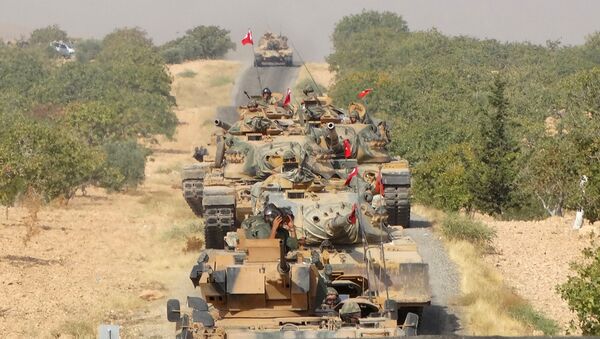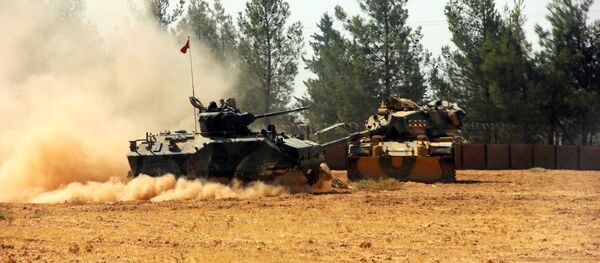In his article, which was published by the Russian news agency Regnum, Tarasov wrote that Ankara, first and foremost, is fighting the Kurdistan Workers' Party (PKK), which in turn is struggling for the status of Kurds on Syrian territory.
Always seen as a force supporting Syrian Kurds, the PKK recently started to form a parallel system of government in Turkey's southeast, according to Tarasov.
The second front is related to Turkey's current fight against Daesh, he said, quoting Turkish experts as saying that "until recently, Ankara did not wage a full-fledged war against this terrorist group because Ankara instead fought both the government forces and activists of the Kurdish Democratic Union."
Now Ankara is combating Daesh terrorists who have already entered a military confrontation with Turkish troops and who employ terror tactics on Turkish soil.
However, Ankara has yet to clearly define its stance on Damascus, recently leading to a confrontation, Tarasov recalled.
He said that breaking this multi-front deadlock will only be possible if Ankara enters peace negotiations with the PKK, reaches a consensus with Damascus and gets US support – something that will finally enable Turkey to focus on its arch-foe, Daesh.
In this vein, further bolstering relations with Russia and Iran will be of paramount importance to Turkey's international clout, Tarasov said, adding that it is Ankara, not Damascus, that currently remains "in the center of a large Syrian game."
The Turkish military began its so-called Euphrates Shield operation in Syria on Wednesday, sending in dozens of tanks and hundreds of troops.
The operation is officially aimed at pushing Daesh terrorists out of Jarablus and preventing Kurdish forces from extending their territory in northern Syria. Many international experts, however, noted that the Turkish operation in Jarablus is aimed first of all against Kurds, and only then — against Islamist radicals.
Kurdish Syrian Democratic Forces troops were greeted with enthusiasm two weeks ago when Daesh-held Manbij was finally liberated: the city is strategically located between Syrian territory held by the terrorist organization and the Turkish border.
It must be remembered that Turkey had issued an angry warning to Kurdish troops late last year not to attempt to enter Daesh territory west of the Euphrates River. Despite the incriminating undertones of this demand, the Turkish government's actions could be explained by an attempt to prevent Kurdish forces from gaining complete control of the part of Syria located directly south of Turkey.
The situation in Syria was discussed by Russian President Vladimir Putin and his Turkish counterpart Recep Tayyip Erdogan during a telephone conversation on Friday.
The Turkish President informed Putin about the ongoing Turkish military operation in northern Syria and stressed the importance of a joint fight against Daesh and other terrorist groups.





